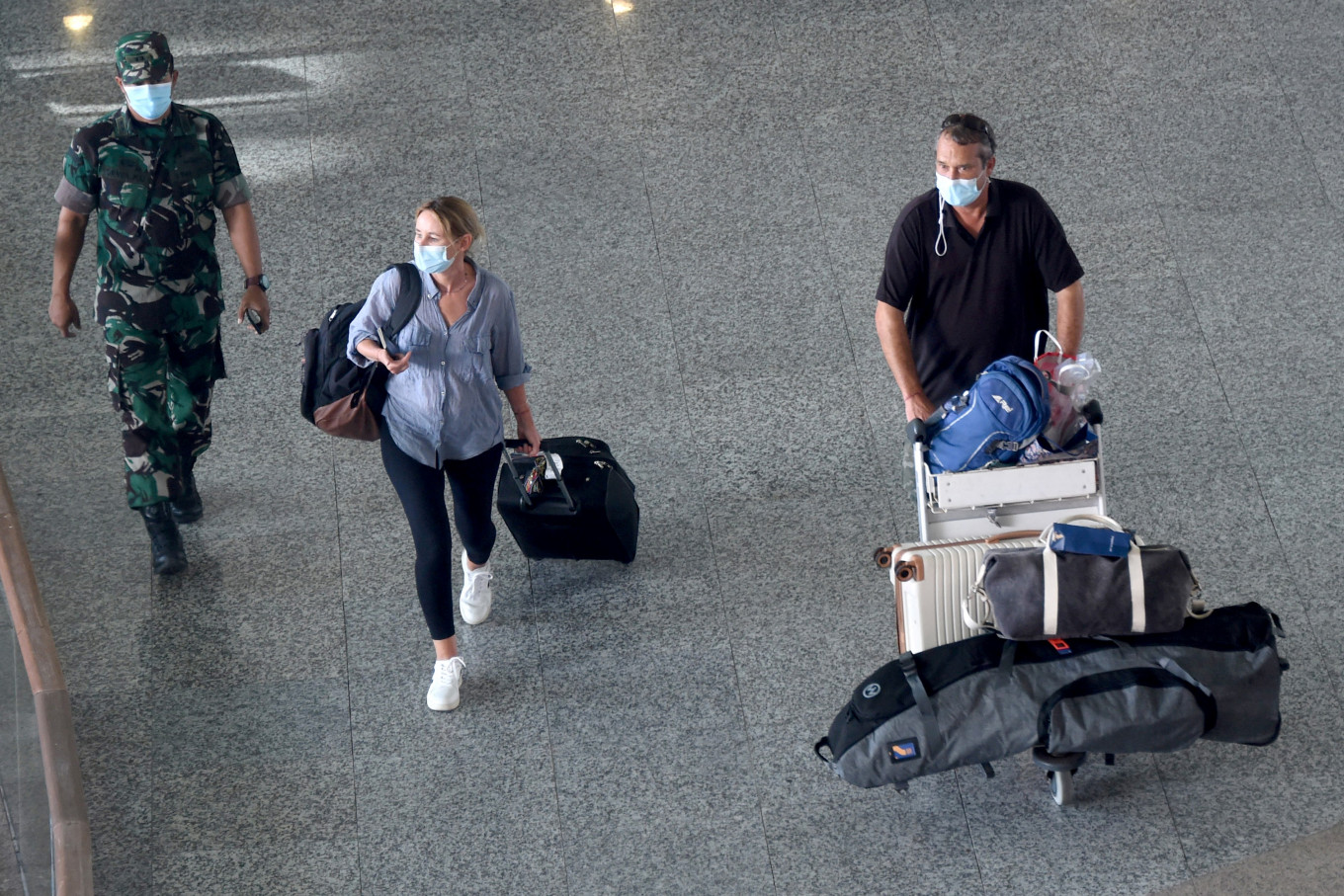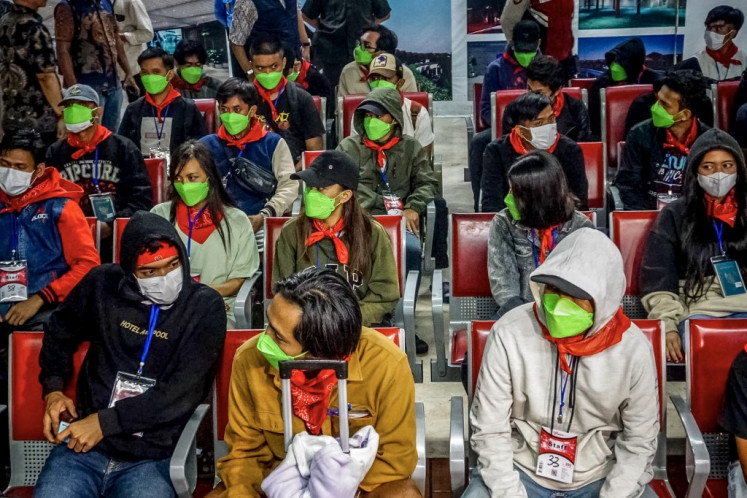Popular Reads
Top Results
Can't find what you're looking for?
View all search resultsPopular Reads
Top Results
Can't find what you're looking for?
View all search resultsGovernment relaxes more curbs
New quarantine-free policy for fully vaccinated foreign arrivals requires only entry PCR tests.
Change text size
Gift Premium Articles
to Anyone
T
he government further eased restrictions in many areas in Java and Bali and waived quarantine for all fully vaccinated foreign arrivals entering the country starting on Tuesday, as daily coronavirus cases have dropped more than 90 percent from a mid-February peak.
Tourism and Creative Economy Minister Sandiaga Salahuddin Uno said the new travel policy was expected to help revive the country’s tourism industry and create new economic opportunities for locals.
“The quarantine-free international entry policy will be expanded throughout Indonesia, requiring only entry PCR tests,” he said during a weekly press briefing on Monday.
The decision was made after the government completed a two-week trial of quarantine-free international travel to Bali, Batam and Bintan. The results of the trial showed a “very low” positivity rate and a declining COVID-19 reproduction number, according to Sandiaga.
The country has gradually relaxed its travel restrictions, most recently by allowing domestic travelers to board flights without presenting negative test results.
It will also expand its Bali visa-on-arrival program to 42 countries, according to Sandiaga, without specifying the countries that would be added to the list.
Read also: Bali becomes first destination in Indonesia to waive quarantine for vaccinated foreign travelers
Indonesia relaunched the Bali visa-on-arrival program on March 7 for holidaymakers flying in from 23 countries, including the United States, New Zealand, the United Kingdom, Italy, Germany and all Southeast Asian nations to spur foreign tourist arrivals. It also revoked the obligation to have a sponsor for a tourist e-visa.
PPKM levels lowered
More regencies and cities across Java and Bali are now having their public activity restriction (PPKM) levels lowered, as the country continues its road to reaching endemicity.
On Monday, the government lowered the PPKM in six regencies and cities, including East Java’s capital of Surabaya, to level 1, the lowest in the four-tiered system. The number of regencies and cities having their restriction level lowered from level 3 to level 2 has now also increased from 55 to 83.
Read also: Pandemic curbs eased in Jakarta, Surabaya
Indonesia reported just under 4,700 cases nationwide on Monday, the lowest since it recorded over 64,700 cases on Feb. 16 during the third wave of infections tied to the Omicron variant.
The previous week also saw its seven-day average for daily caseload drop to around 9,000 cases, from 18,000 cases the week prior. Deaths in the past one week have also started to decline, with its seven-day average decreasing to 207 from 286 deaths the week prior.
“We will carry out the normalization process in the next few months. If everything goes smoothly from Ramadan to Idul Fitri, we will continue this process,” Sandiaga said. “Preparations for a post-pandemic transition [and into] the endemic state are expected to be completed by the third quarter of this year in June.”
He added that people would be permitted to engage in religious activities during the upcoming Ramadan fasting month and that those who were fully vaccinated would be allowed to travel to their hometowns.
Public immunity
Easing of restrictions also came following a recent serology survey, which tested some 9,500 Indonesians across the country and found an average of 86.6 percent of Indonesians showed immunity against the virus.
A closer look at the survey shows that 99.1 percent of fully vaccinated Indonesians had antibodies against the virus. Meanwhile, 73.9 percent of Indonesians who have never been vaccinated or tested positive for the virus also had antibodies, confirming experts’ belief that a significant number of cases have gone undetected.
Read also: Indonesia prepares road map to endemic status as virus wanes
But the survey did not capture recent developments in vaccination and how many people gained immunity through infections during the coronavirus third wave because it was conducted from November to December last year, before cases began to pick up in January.
The country reported a total of 5.9 million cases since the pandemic hit in early 2020, but it is also not clear how many of them were reinfections.
By Monday, nearly 75 percent of the 208.2 million targeted population nationwide had been fully vaccinated. This makes up almost 57 percent of Indonesia’s total 273 million population. But only 8.4 percent of the targeted population had received booster shots.
Health Minister Budi Gunadi Sadikin said on Friday that the government would use such a serology survey as a basis for future pandemic-handling policies and planned to conduct another serology survey sometime in the middle of this year.
Danger still looms
Experts urge caution in easing restrictions in Indonesia, particularly because other countries, such as Italy and the United Kingdom, began to see their COVID-19 cases increase after restrictions were eased.
Public health expert Tjandra Yoga Aditama said that while more research would be necessary to understand why other countries were experiencing another spike in cases, Indonesia should be on the lookout for a similar spike in the future.
“We can be thankful that the country has seen declining COVID-19 cases, but we need to understand that this has also come amid a decline in COVID-19 testing,” he said on Friday, adding that the government should look to intensifying its testing and tracing efforts.
Some 150,000 were tested daily in the past three days, less than half of 348,000 people tested on Feb. 16 during the Omicron peak.










